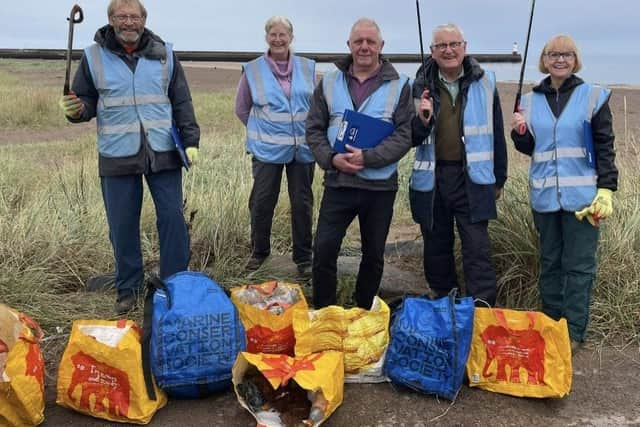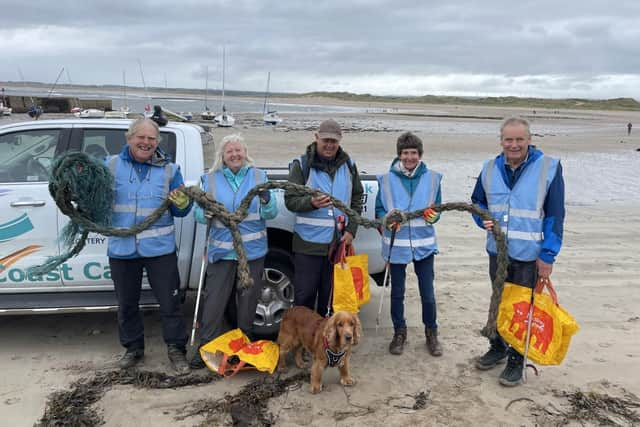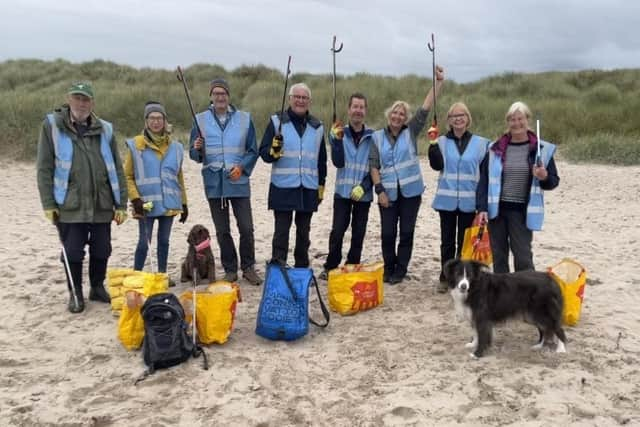Northumberland litter-pickers join the Marine Conservation Society’s Great British Beach Clean
and live on Freeview channel 276
The Marine Conservation Society’s Source to Sea citizen science project resulted in over 100 beach cleans organised across the UK.
Coast Care, part of the Northumberland Coast Area of Outstanding Natural Beauty (AONB) Partnership, organised six clean ups along the coast.
Advertisement
Hide AdAdvertisement
Hide AdFour took place at Spittal, Beadnell, Bamburgh and Alnmouth beaches, and two more are planned for Cresswell Dunes at Druridge Bay and Amble on September 23.


Emma Wilson, AONB Volunteer and Access Officer, said: "We have a wonderful community of over 150 volunteers. They are an incredible bunch of passionate conservationists, and they turn out all weathers, all year round. Very proud of them all for all they do.”
Newbiggin Town Council also organised a beach cleaning morning, and saw volunteers committed to litter picking even in the rain.
According to data, much of the pollution found on beaches is from inland that has found its way into streams, rivers or drains.
Advertisement
Hide AdAdvertisement
Hide AdThe data collected on pollution enables the Marine Conservation Society to campaign for positive change to protect the ocean, and has already helped implement plastic bag charges, better wet wipe labelling, and supporting a tax on single-use plastic items.


Clare Trotman, Beachwatch officer at the Marine Conservation Society, said: “We wouldn’t be able to do the work we do at the Marine Conservation Society without the support of our volunteers heading out to the coast to collect vital information on what’s polluting our seas.
“With beach cleans happening across the UK, from remote beaches to busy seaside resorts, there’s so many ways to get involved and support us this year. If you can’t make it to the beach, you can still take part by doing a local litter pick and survey where you live.”
Some of the most commonly found items on beaches are from sewage discharges. Sewage-related pollution, often composed of plastics like period products and wet wipes, was recorded on 75% of beaches across the UK in 2022.
Advertisement
Hide AdAdvertisement
Hide AdDr Laura Foster, head of clean seas at the Marine Conservation Society, said: “Sewage-related litter, like wet wipes and period products, is often a sign of a sewage discharge nearby.


"Sewage not only contains wrongly flushed items but also a toxic soup of chemicals including ‘forever chemicals’ and pharmaceuticals. Entering our beautiful seas untreated, they wreak havoc with the ocean’s delicate balance. But it doesn’t have to be this way.
“The data our volunteers collect on sewage-related litter this year will help us understand the scale of the problem and keep fighting for sewage-free seas.”
This year’s Great British Beach Clean was sponsored by Cully & Sully Soup.
Advertisement
Hide AdAdvertisement
Hide AdVolunteers were asked to share their pictures of sewage-related items or sewage outlet pipes they spot during their clean with the charity by tagging @mcsuk on social media and using the #SewageFreeSeas hashtag, or submitting them to the charity’s website, to help show how pervasive the issue is.
To find out more information visit the Marine Conservation Society website.